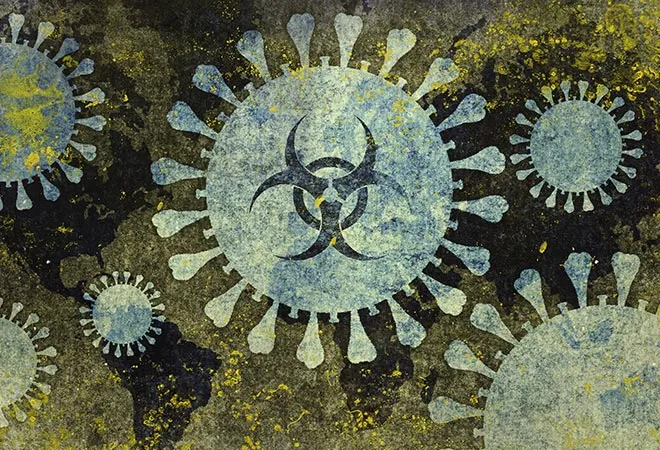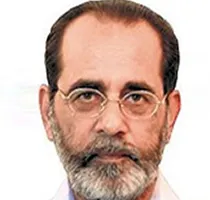The COVID-19 pandemic began as a global health crisis. As it spread rapidly across nations, country after country responded with a lockdown, triggering a global economic crisis. Certain geopolitical trendlines were already discernible but the COVID-19 shock therapy has brought these into sharper focus, defining the contours of the emerging global (dis)order.
Asia ascending, U.S. waning
The first trend which became clear in the aftermath of the 2008 global financial crisis is the rise of Asia. Economic historians pointed to its inevitability, recalling that till the 18th century, Asia accounted for half the global GDP. The Industrial Revolution accompanied by European naval expansion and colonialism contributed to the rise of the West, and now the balance is being restored. The 2008 financial crisis showed the resilience of the Asian economies, and even today, economic forecasts indicate that out of the G-20 countries, only China and India are likely to register economic growth during 2020.
Asian countries have also demonstrated greater agility in tackling the pandemic compared to the United States and Europe. This is not limited to China but a number of other Asian states have shown greater responsiveness and more effective state capacity. Consequently, Asian economies will recover faster than those in the West.
The second trend is the retreat of the U.S. after a century of being in the forefront of shaping the global order. From the Treaty of Versailles and the League of Nations after World War I or the creation of the United Nations and Bretton Woods institutions after World War II, to leadership of the western world during the Cold War, moulding global responses to threats posed by terrorism or proliferation or climate change, the U.S. played a decisive role.
U.S. hubris and arrogance also generated resentment, more evident in recent years. Interventions in Afghanistan and Iraq have become quagmires that have sapped domestic political will and resources. This is the fatigue that (former) U.S. President Barack Obama sensed when he talked of “leading from behind”. President Donald Trump changed it to “America first” and during the current crisis, the U.S.’s efforts at cornering supplies of scarce medical equipment and medicines and acquiring biotech companies engaged in research and development in allied states, show that this may mean “America alone”. Moreover, even as countries were losing trust in the U.S.’s leadership, its bungled response at home to the pandemic indicates that countries are also losing trust in the U.S.’s competence. The U.S. still remains the largest economy and the largest military power but has lost the will and ability to lead. This mood is unlikely to change, whatever the outcome of the election later this year.
Intra-European fission
A third trend is the European Union’s continuing preoccupation with internal challenges generated by its expansion of membership to include East European states, impact of the financial crisis among the Eurozone members, and ongoing Brexit negotiations. Threat perceptions vary between old Europe and new Europe making it increasingly difficult to reach agreement on political matters e:g relations with Russia and China. The trans-Atlantic divide is aggravating an intra-European rift. Rising populism has given greater voice to Euro-sceptics and permitted some EU members to espouse the virtues of “illiberal democracy”.
Adding to this is the North-South divide within the Eurozone. Strains showed up when austerity measures were imposed on Greece, Italy, Spain and Portugal a decade ago by the European Central Bank, persuaded by the fiscally conservative Austria, Germany and the Netherlands. Recently, ECB chief Christine Lagarde’s press statement in end-March that “ECB is not here to close spreads” undermined any solidarity that the Italians felt as they battled with the pandemic and growing borrowing costs.
Further damage was done when Italy was denied medical equipment by its EU neighbours who introduced export controls, which led to China airlifting medical teams and critical supplies. Schengen visa or free-border movement has already become a victim to the pandemic. The EU will need considerable soul searching to rediscover the limits of free movement of goods, services, capital and people, the underlying theme of the European experiment of shared sovereignty.
Rising China
A fourth trend, related to the first, is the emergence of a stronger and more assertive China. While China’s growing economic role has been visible since it joined the World Trade Organization at the turn of the century, its more assertive posture has taken shape under President Xi Jinping’s leadership with the call that a rejuvenated China is now ready to assume global responsibilities. Chinese assertiveness has raised concerns, first in its neighbourhood, and now in the U.S. that feels betrayed because it assisted China’s rise in the hope that an economically integrated China would become politically more open. In recent years, the U.S.-China relationship moved from cooperation to competition; and now with trade and technology wars, it is moving steadily to confrontation. The pandemic has seen increasing rhetoric on both sides and with the election season in the U.S., confrontation will only increase. A partial economic de-coupling had begun and will gather greater momentum.
Mr. Xi has engaged in an unprecedented centralisation of power, and with the removal of the two-term limit, has made it clear that he will continue beyond 2022. His signature Belt and Road Initiative seeks to connect China to the Eurasia and Africa through both maritime and land routes by investing trillions of dollars in infrastructure building as a kind of pre-emptive move against any U.S. attempts at containment. Even if Mr. Xi’s leadership comes under questioning, it may soften some aggressive policy edges but the confrontational rivalry with U.S. will remain.
Fading organisations
Global problems demand global responses. With COVID-19, international and multilateral bodies are nowhere on the scene. The World Health Organisation (WHO) was the natural candidate to lead global efforts against the health crisis but it has become a victim of politics. Its early endorsement of the Chinese efforts has put it on the defensive as the U.S. blames the outbreak on a Chinese biotech lab and accuses Beijing of suppressing vital information that contributed to the spread. The UN Security Council (UNSC), the G-7 and the G-20 (latter was structured to co-ordinate a global response to the 2008 financial crisis) are paralysed at when the world faces the worst recession since 1929.
The reality is that these institutions were always subjected to big power politics. During the Cold War, U.S.-Soviet rivalry blocked the UNSC on many sensitive issues and now with major power rivalry returning, finds itself paralysed again. Agencies such as WHO have lost autonomy over decades as their regular budgets shrank, forcing them to increasingly rely on voluntary contributions sourced largely from western countries and foundations. U.S. leadership strengthened the Bretton Woods institutions in recent decades (The World Bank spends 250% of WHO’s budget on global health) because the U.S.’s voting power gives it a blocking veto. The absence of a multilateral response today highlights the long-felt need for reform of these bodies but this cannot happen without collective global leadership.
The energy factor
The final trend relates to energy politics. Growing interest in renewables and green technologies on account of climate change concerns, and the U.S. emerging as a major energy producer were fundamentally altering the energy markets. Now, a looming economic recession and depressed oil prices will exacerbate internal tensions in West Asian countries which are solely dependent on oil revenues. Long-standing rivalries in the region have often led to local conflicts but can now create political instability in countries where regime structures are fragile.
A vaccine for the novel coronavirus, possibly by end-2020, will help deal with the global health crisis but these unfolding trends have now been aggravated by the more pernicious panic virus. Rising nationalism and protectionist responses will prolong the economic recession into a depression, sharpening inequalities and polarisations. Greater unpredictability and more turbulent times lie ahead.
This commentary originally appeared in The Hindu.
The views expressed above belong to the author(s). ORF research and analyses now available on Telegram! Click here to access our curated content — blogs, longforms and interviews.




 PREV
PREV


